PV column
Photovoltaic
2023/04/11
Photovoltaic and Energy Storage System Installations in Germany (2022)
Germany is relatively similar to Japan in terms of the amount of renewable energy installation, the scale of its economy, and the size of its land. In this column, we would like to introduce the amount of photovoltaic power generation and energy storage systems installed in 2022, as announced by BSW (Bundesverband Solarwirtschaft e. V.), the German photovoltaic association.
(Reference exchange rate, the Japanese column only)
The EUR amounts in the original report are converted to Japanese yen using the average exchange rate of 145.0 yen to the EUR in April 2023.
**********
1. Solar batteries boom exponentially
Berlin, March 02, 2023
The number of solar power storage systems has increased fivefold in the last four years. According to calculations by the German Solar Industry Association (BSW), 52 percent more solar home storage systems were installed in Germany last year than in 2021. The number of solar batteries in Germany has grown exponentially over the past four years and, according to BSW estimates, is likely to continue to increase as a result of rising electricity costs in private households and in industry and commerce. (See press graphics; Solar batteries are booming exponentially、Over 1 GWh storage capacity for industrial storage)
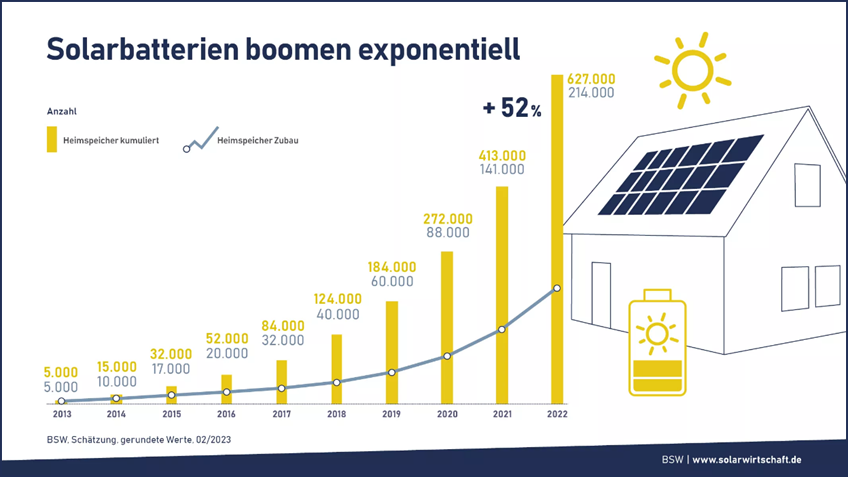
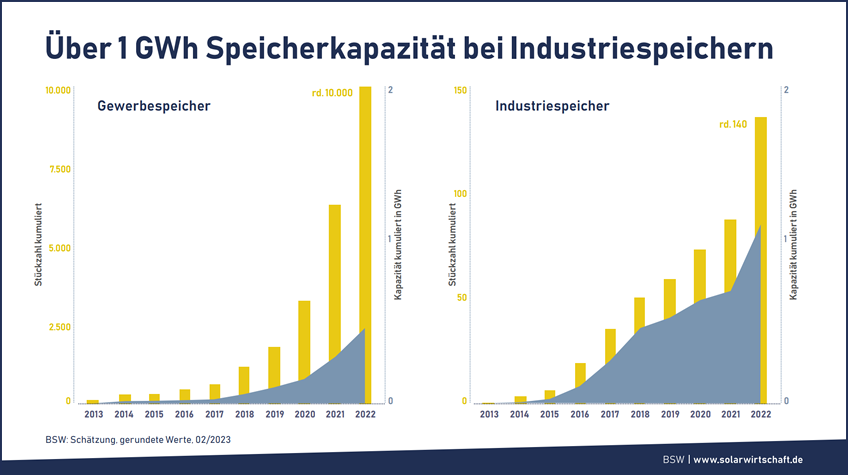
According to YouGov representative surveys commissioned by BSW, about half of private property owners can imagine storing self-generated solar power as needed. 28 percent of entrepreneurs plan to install solar power storage in the next three years. Approx. 630,000 private households and 10,000 companies have already done so. Approx. 214,000 home storage systems and approx. 3,900 commercial storage systems were added in 2022 (cf. 2021: approx. 141,000 and approx. 2,750, respectively). This was the result of BSW calculations based on figures from the Federal Network Agency. In purely mathematical terms, the home storage park can store the daily electricity consumption of all private households in Munich.
BSW Chief Executive Carsten Körnig: “The installation of a storage system is increasingly becoming the standard for the construction of new solar power systems. This not only benefits plant operators, but also pays dividends in terms of flexibility and security of supply for the entire power system. Home, commercial and industrial storage are essential building blocks for a successful and efficient energy transition.”
More than two-thirds of newly installed solar power systems on private properties are now installed together with a home storage system. This allows households to use self-generated solar power around the clock. As a result of the energy crisis, newly installed solar power capacity in the home segment of rooftop PV systems has increased almost fivefold in the last four years, according to BSW data.
Körnig is also pleased with the positive development of storage demand in the commercial sector. According to his association’s surveys, 53 percent of the entrepreneurs surveyed said they were doing so to save on electricity costs, 29 percent to store electricity for e-mobility, and 20 percent for peak smoothing reasons with the goal of reducing spending on grid charges. To balance the generation fluctuations of weather-dependent renewable energies and to stabilize the power grid, the storage capacity installed in Germany should be increased eightfold from the currently estimated 6.7 gigawatt hours to 55 gigawatt hours by 2030, according to the recommendation of the solar and storage association BSW.
More info:
Consumers can find free and company-independent information about solar batteries at http://www.die-sonne-speichern.de/. This also includes a link to a short information film illustrating the technology and contacts to the solar trade.
This original document (German version only) can be downloaded here.
**********
2. Statistical data on the German Solar Power (Photovoltaic) Market
An overview of the German photovoltaic (PV) market at the end of 2022:
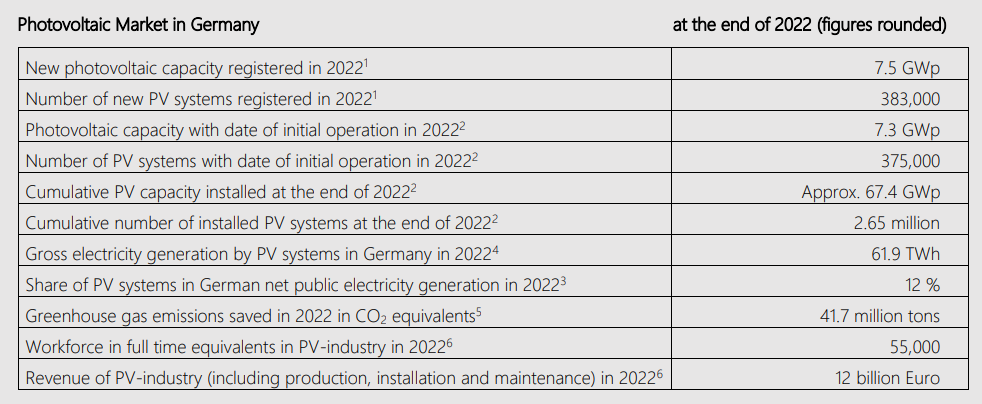
*2 Federal Network Agency, based on date of initial operation
*3Fraunhofer-Institut für Solare Energiesysteme (ISE), see:
https://energy-charts.info/charts/energy_pie/chart.htm?l=de&c=DE&year=2022&interval=year
*4 BDEW (2023), preliminary estimate
*5 Umweltbundesamt, Emmisionsbilanz erneuerbare Energieträger (2023). see:
https://www.umweltbundesamt.de/themen/klima-energie/erneuerbare-energien/erneuerbare-energien-in-zahlen#emissionsbilanz
*6 BSW-Solar & EuPD Research & ees Europe (2023), preliminary estimate
Installed PV capacity in Germany until end of 2022
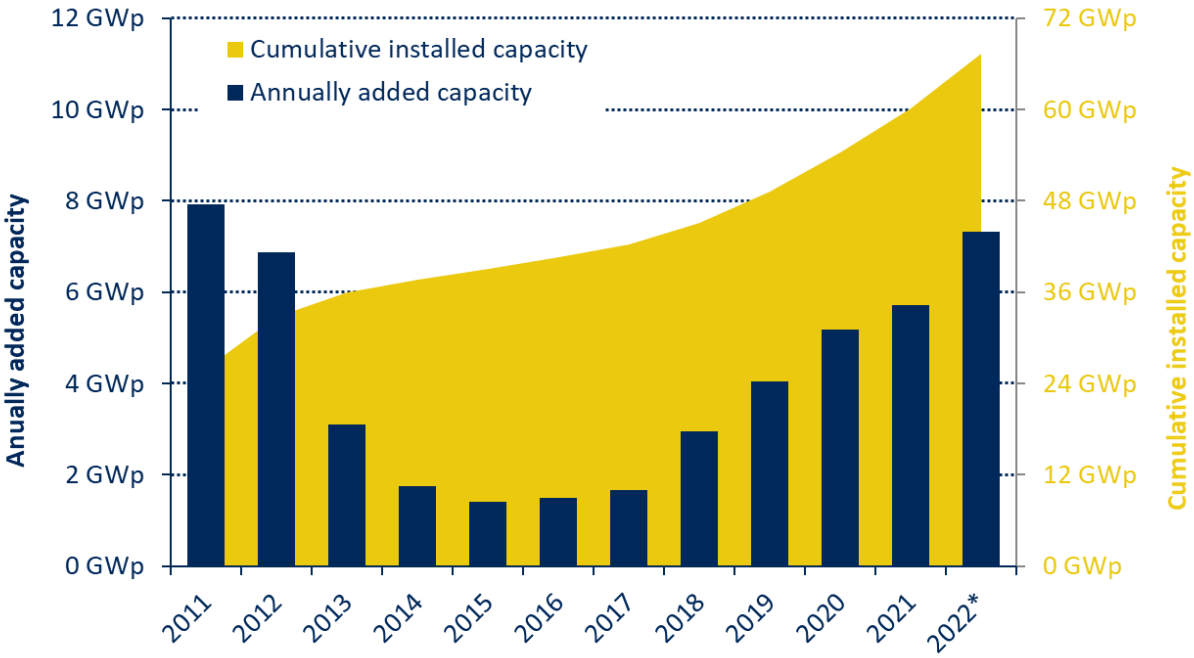
The original document (English version) can be downloaded here.
**********
3. Statistical data on the German Solar Battery Storage and E-mobility Market
An overview of the German market for solar battery home storage systems and e-mobility at the end of 2022:
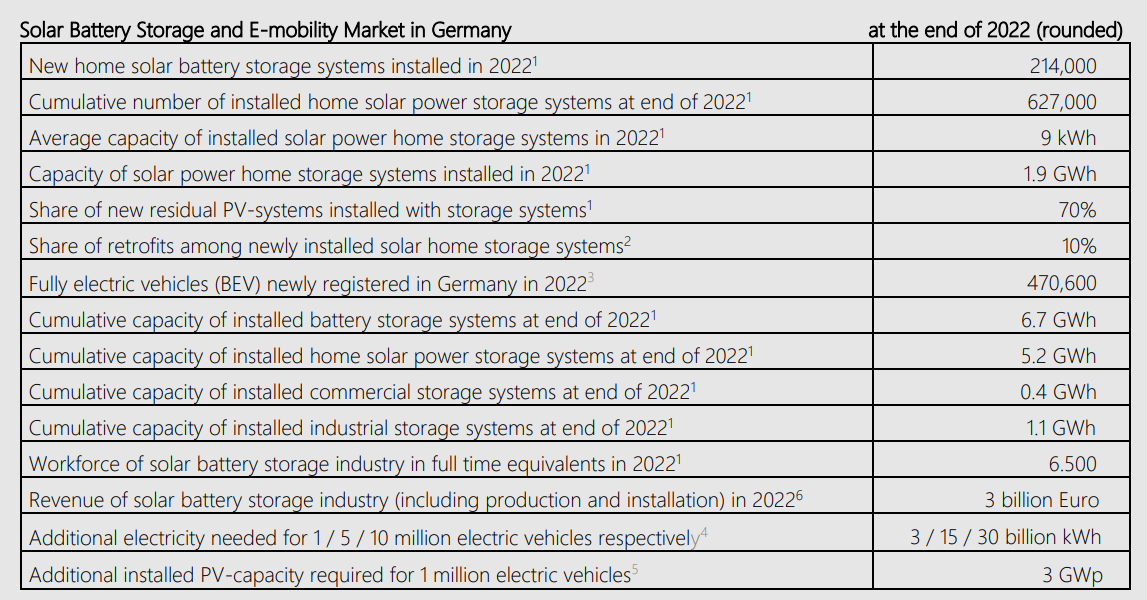
*2 BSW-Solar, own survey: “BSW Speicherpreismonitor Deutschland”
*3 KBA (2022), see
https://www.kba.de/DE/Presse/Pressemitteilungen/Fahrzeugzulassungen/2023/pm01_2023_n_12_22_pm_komplett.html;jsessionid=A83311FCD52AC2C5F5969E5B68BA6495.live21322
*4 BSW-Solar, own calculation; assumptions: 15,000 km mileage per year, average consumption 20 kWh per 100 km mileage
*5 BSW-Solar, own calculation, for assumptions see footnote 4
*6 BSW-Solar & EuPD Research & ees Europe (2023), preliminary estimate
The original document (English version) can be downloaded here.
**********
Acknowledgments: We would like to take this opportunity to thank the source BSW for their presentation materials and data.

